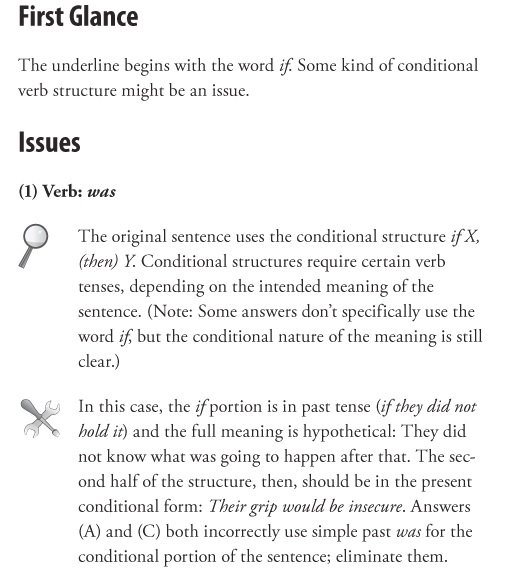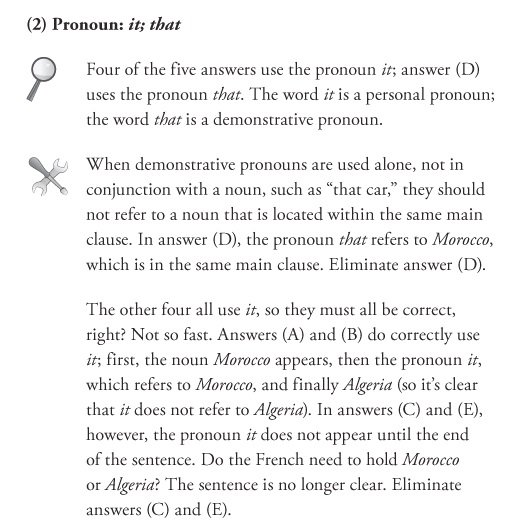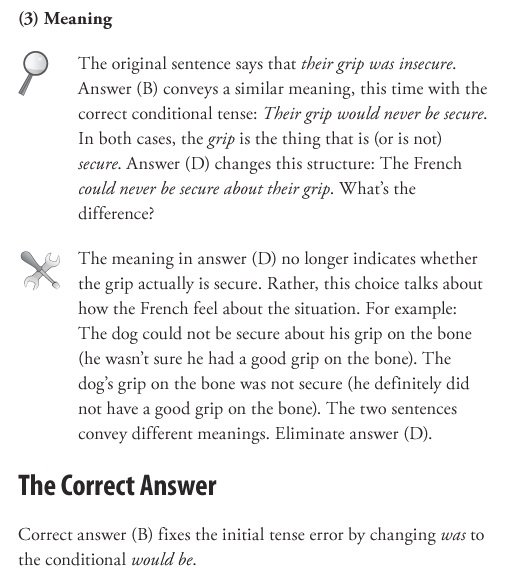Events & Promotions
|
|

GMAT Club Daily Prep
Thank you for using the timer - this advanced tool can estimate your performance and suggest more practice questions. We have subscribed you to Daily Prep Questions via email.
Customized
for You
Track
Your Progress
Practice
Pays
Not interested in getting valuable practice questions and articles delivered to your email? No problem, unsubscribe here.
- Nov 18
11:00 AM PST
-12:00 PM PST
Join us in a live GMAT practice session and solve 30 challenging GMAT questions with other test takers in timed conditions, covering GMAT Quant, Data Sufficiency, Data Insights, Reading Comprehension, and Critical Reasoning questions. - Nov 22
11:00 AM IST
-01:00 PM IST
Do RC/MSR passages scare you? e-GMAT is conducting a masterclass to help you learn – Learn effective reading strategies Tackle difficult RC & MSR with confidence Excel in timed test environment - Nov 23
11:00 AM IST
-01:00 PM IST
Attend this free GMAT Algebra Webinar and learn how to master the most challenging Inequalities and Absolute Value problems with ease. - Nov 25
10:00 AM EST
-11:00 AM EST
Prefer video-based learning? The Target Test Prep OnDemand course is a one-of-a-kind video masterclass featuring 400 hours of lecture-style teaching by Scott Woodbury-Stewart, founder of Target Test Prep and one of the most accomplished GMAT instructors.
B
Be sure to select an answer first to save it in the Error Log before revealing the correct answer (OA)!
Difficulty:
 35%
(medium)
35%
(medium)
Question Stats:
69% (01:38) correct 31%
(01:52)
wrong
31%
(01:52)
wrong  based on 9124
sessions
based on 9124
sessions
History
Date
Time
Result
Not Attempted Yet
Affording strategic proximity to the Strait of Gibraltar, Morocco was also of interest to the French throughout the first half of the twentieth century because they assumed that if they did not hold it, their grip on Algeria was always insecure.
(A) if they did not hold it, their grip on Algeria was always insecure
(B) without it their grip on Algeria would never be secure
(C) their grip on Algeria was not ever secure if they did not hold it
(D) without that, they could never be secure about their grip on Algeria
(E) never would their grip on Algeria be secure if they did not hold it

01.jpg [ 82.98 KiB | Viewed 65867 times ]

02.jpg [ 94.01 KiB | Viewed 65788 times ]

03.jpg [ 92.49 KiB | Viewed 65812 times ]
Guys, this question was asked a few times.
It is an excellent question to learn from.
Please take time to explain thoroughly.
Thanks!
https://www.nytimes.com/1983/03/06/books/nonfiction-in-brief-003388.html
In addition to its strategic proximity to the Straits of Gibraltar, Morocco was of interest to the French because without it their grip on Algeria would never be secure. Mr. Porch describes with flourishes the period between 1903 and 1912 during which France ''nibbled'' away at Morocco until she digested her into the empire.
(A) if they did not hold it, their grip on Algeria was always insecure
(B) without it their grip on Algeria would never be secure
(C) their grip on Algeria was not ever secure if they did not hold it
(D) without that, they could never be secure about their grip on Algeria
(E) never would their grip on Algeria be secure if they did not hold it
Attachment:
01.jpg [ 82.98 KiB | Viewed 65867 times ]
Attachment:
02.jpg [ 94.01 KiB | Viewed 65788 times ]
Attachment:
03.jpg [ 92.49 KiB | Viewed 65812 times ]
Guys, this question was asked a few times.
It is an excellent question to learn from.
Please take time to explain thoroughly.
Thanks!
https://www.nytimes.com/1983/03/06/books/nonfiction-in-brief-003388.html
In addition to its strategic proximity to the Straits of Gibraltar, Morocco was of interest to the French because without it their grip on Algeria would never be secure. Mr. Porch describes with flourishes the period between 1903 and 1912 during which France ''nibbled'' away at Morocco until she digested her into the empire.
Kudos
Bookmarks
bmw, thanks for bringing the question back!
OA is B
Lets see B:
Affording strategic proximity to the Strait of Gibraltar, Morocco was also of interest to the French throughout the first half of the twentieth century because they assumed that without it their grip on Algeria would never be secure
Oranges agree with each other
Blues agree with each other
beckee, the above is slightly different to what you stated; you may wish to revisit or show that I am bullsh*tting
For analysis of other choice, see below:
OA is B
Lets see B:
Affording strategic proximity to the Strait of Gibraltar, Morocco was also of interest to the French throughout the first half of the twentieth century because they assumed that without it their grip on Algeria would never be secure
Oranges agree with each other
Blues agree with each other
beckee, the above is slightly different to what you stated; you may wish to revisit or show that I am bullsh*tting
For analysis of other choice, see below:
botirvoy
Kudos
Bookmarks
Multiple issues:
1. This construction implies a conditional. Check the if constrcution.
Also note that, not every conditional requires an if.Also, then can be correctly omitted from If-then constructions.
One more rule. was cannot be used in conditional's mail clause. Conditional calls for would
We have a split between if and non-if clauses. Both splits are correct, because the non-if clause still correctly indicates the meaning of a conditional. subject assumed that without something, something would happen - A clear conditional.
Choice A uses was in place of would - incorrect
Choice B correct use of would
Choice C - again, incorrect was
Choice D - could - an acceptable conditional but changes the meaning
choice E - would - correct
Other issues
A - wordy, awkward
B - correct
C - not ever: wordy ; what does pronoun it refer to? Morocco, Algeria or grip?
D - that - incorrect pronoun, could: changes meaning.
E - Correct verb, correct tense. but - the inversion? Only in poems, not on the gmat. and the pronoun it again.
(Note however that I have seen many OG problems whose correct choices have a pronoun with multiple possible antecedents. I would suggest that one doesn't eliminate such choices right away only on this basis)
One more issue: Secure about theri grip in C has different meaning than intended; intended meaning is a secure grip.
1. This construction implies a conditional. Check the if constrcution.
Also note that, not every conditional requires an if.Also, then can be correctly omitted from If-then constructions.
One more rule. was cannot be used in conditional's mail clause. Conditional calls for would
We have a split between if and non-if clauses. Both splits are correct, because the non-if clause still correctly indicates the meaning of a conditional. subject assumed that without something, something would happen - A clear conditional.
Choice A uses was in place of would - incorrect
Choice B correct use of would
Choice C - again, incorrect was
Choice D - could - an acceptable conditional but changes the meaning
choice E - would - correct
Other issues
A - wordy, awkward
B - correct
C - not ever: wordy ; what does pronoun it refer to? Morocco, Algeria or grip?
D - that - incorrect pronoun, could: changes meaning.
E - Correct verb, correct tense. but - the inversion? Only in poems, not on the gmat. and the pronoun it again.
(Note however that I have seen many OG problems whose correct choices have a pronoun with multiple possible antecedents. I would suggest that one doesn't eliminate such choices right away only on this basis)
One more issue: Secure about theri grip in C has different meaning than intended; intended meaning is a secure grip.













